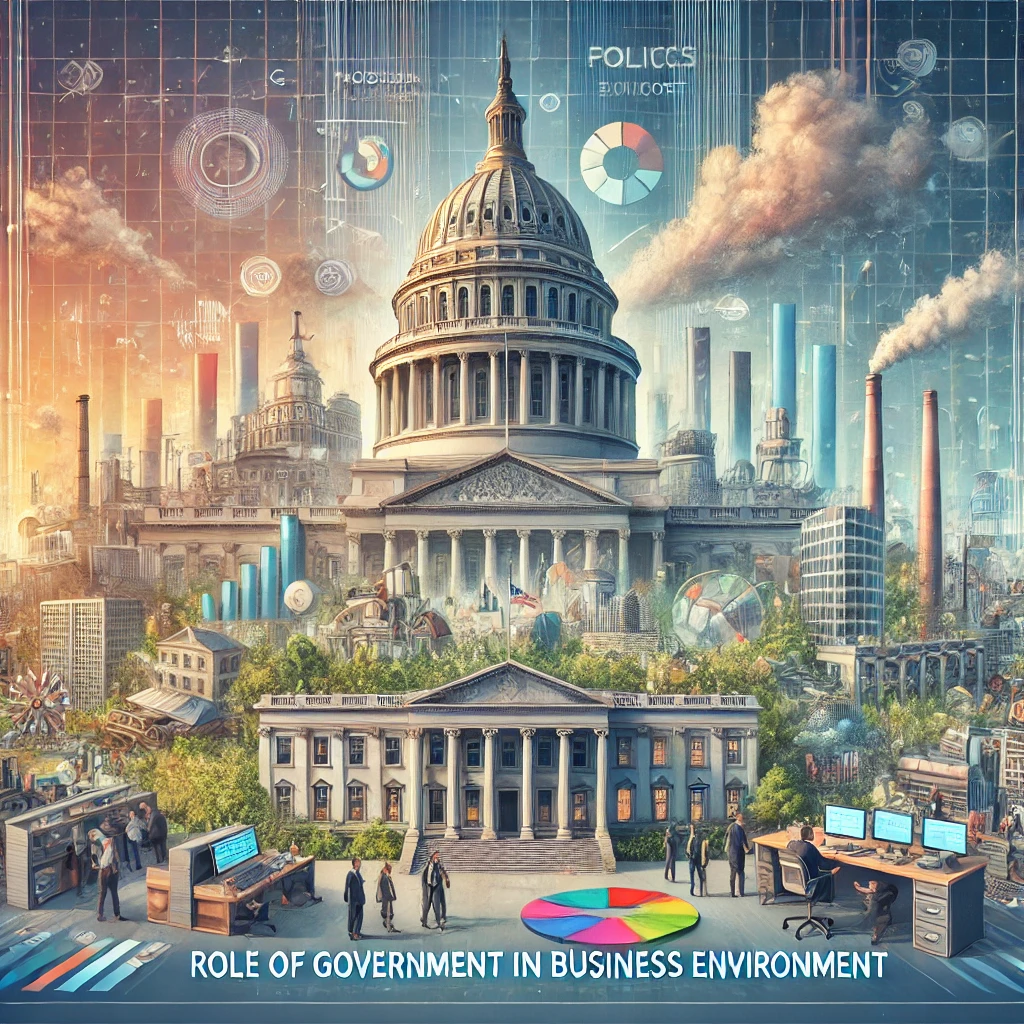The role of the government in the business environment is highly instrumental in deciding the course, growth, and sustainability of businesses. Governments create a framework that governs and ensures the regulation, infrastructural, and policy frameworks put in place that promote wholesome competition, growth, and stability within the economy. Understanding all the various roles that governments perform in business environments is pertinent for any person interested in how economies work and businesses prosper. In this article, we explore the regulatory role, promoter role, entrepreneurial role, planning role, and economic role of government in business.

Regulatory Role of Government in Business
The regulatory role of government is the most apparent and potent aspect in which it engages with the business environment. It is from such a basis that countries across the globe establish laws that the businesses operate under. From these regulations, there is provision for fair play, the protection of consumers, environment safety, and market competition. In the enforcement of such rules, governments guide businesses to function efficiently and ethically.
Government’s Role in Creating Regulations
Regulation refers to the laws and rules set by the government to control the activities of businesses. These regulations are broad in scope, encompassing business ethics, labor rights, environmental protection, and financial reporting. The regulation is designed by the government so that businesses do not exploit workers, consumers, or the environment for profit.
For instance, labor laws on minimum wages, employee safety regulations, and anti-discrimination policies protect the workers. The governments enforce laws related to the environment to control pollution, regulate waste disposal, and ensure sustainable utilization of natural resources. Thus, it helps to keep the business activities in balance with societal welfare.
Governments also regulate industries in terms of preventing monopolies and encouraging competition. Anti-trust laws, for example, prevent large corporations from dominating the market unfairly. Government roles in business regulation help ensure that smaller businesses are able to compete. It is through this aspect that the marketplace becomes more dynamic and diverse.
Key Examples of Regulatory Functions
- Consumer Protection Laws: Governments set standards for product safety, labeling, and quality to protect consumers from unsafe or misleading products.
- Environmental Regulations: Governments regulate pollution, waste management, and resource usage to ensure businesses do not harm the environment.
- Labor Laws: Governments implement laws regarding working hours, wages, employee benefits, and health and safety standards in the workplace.
- Taxation Laws: Governments create tax laws that businesses must follow, ensuring fair tax contributions and promoting economic growth.
- Competition Laws: Governments prevent anti-competitive practices such as price-fixing, monopolies, and cartels to maintain a fair business environment.
Promoter Role of Government in Business
The promoter role of the government in business is concerned with the active efforts made by the government to encourage and support the establishment and growth of businesses. Governments play a pivotal role in creating an environment that is conducive to new businesses starting, growing, and expanding. Such efforts include offering financial incentives, providing infrastructure, and creating policies that encourage entrepreneurship and investment.
Government’s Role in Promoting Entrepreneurship
The main promoter role of the government is to create conditions favorable to the success of new businesses. Governments provide various facilities such as financial aid, tax breaks, and grants to help entrepreneurs initiate their business ventures. These programs are crucial for small and medium-sized enterprises, as it is hard for such entities to raise capital.
Another significant role played by governments is improving access to infrastructure such as transportation and energy systems, as well as communication networks. Therefore, a government can commit funds to the road, port development, and the development of telecommunications, all of which lead to more efficient business execution.
Furthermore, governments offer market information, training, and mentoring to prospective entrepreneurs. They facilitate businesses to learn from market dynamics, legal considerations, and financial management issues. These steps of the government assist in encouraging innovation, business growth, and economic development.
Government Support Programs
- Subsidies and Tax Breaks: Governments often provide subsidies, tax exemptions, or reduced tax rates to new businesses, especially in sectors deemed vital for economic growth.
- Government Grants: For businesses in key industries like technology or renewable energy, governments may offer grants to encourage innovation and development.
- Infrastructure Development: By investing in infrastructure, governments lower the operational costs for businesses and make it easier to transport goods and services.
- Training and Education: Governments provide training programs to entrepreneurs to improve business skills, including financial literacy, marketing, and strategic planning.
Government as an Entrepreneur
Though the main functions of government include regulation and promotion of business, there are some cases in which governments can also act as entrepreneurs. This is called the role of the government as an entrepreneur: where the government itself has a direct stake in businesses in certain areas where private investment may not be enough or even too risky to engage.
Government’s Direct Involvement in Business
In some cases, governments will own and operate businesses where providing the services may not be profitable for private enterprises. These businesses are referred to as public enterprises or state-owned enterprises (SOEs). For example, the government will own and operate the public transport systems, the water and electricity utilities, and the national airlines.
Governments also take up commercial activities when national security or public welfare becomes a concern. In this light, the government can set up defense units for manufacturing defense equipment, or it can introduce health initiatives among the people to maintain national security and public interest. The entrepreneurship role by the government ensures the fulfillment of public needs that the private sector is not interested in entering because of the costs involved, or because of meager return on investment.
Examples of Government as Entrepreneur
- Public Utilities: Governments often own and manage essential services like electricity, water, and gas.
- Public Transport: In many countries, the government operates public transport systems to provide affordable travel options for citizens.
- Defense and Aerospace: Governments may own defense companies or work in collaboration with private firms to manufacture military equipment.
- Healthcare: Governments establish and run hospitals and clinics to ensure healthcare services are available to all citizens, regardless of income.
By taking on entrepreneurial roles in certain industries, governments can ensure that critical services are accessible, affordable, and reliable for citizens. However, government involvement in business can also lead to inefficiencies if not managed properly.
Role of Government as a Planner
The role of the government as a planner in business is the country’s responsibility in planning and managing development. Planning helps the economy gain stability, growth, and social welfare. As part of planning, strategy, and long-term planning go with the setting of national objectives and the directing of resources to be channeled toward sectors assisting in economic growth.
Strategic Economic Planning
Governments engage in strategic economic planning to set broad policy objectives, including full employment, control over inflation, and a balanced budget. Such plans direct the development of key sectors like agriculture, manufacturing, and services.
In many countries, a Five-Year Plan or some other long-term plan is prepared by the government to direct the flow of economic activities. They allocate resources for infrastructures, research and development, education, health, and others that contribute to economic activities.
The role of the government as a planner also relates to creating a good investment climate. Governments may make specific investments in sectors considered highly important, such as technologies, renewable energy, or infrastructure, in order to boost growth in the private sector.
Key Features of Government Planning
- Economic Goals: Governments set clear economic goals, such as boosting GDP growth, reducing unemployment, and increasing exports.
- Resource Allocation: Governments plan how to allocate resources to sectors that need development, such as infrastructure, education, and healthcare.
- Public-Private Partnerships: Governments work with private enterprises to fund large-scale projects that drive economic growth.
- Sustainability: Planning also includes ensuring that growth is sustainable, considering environmental impact and resource conservation.
Economic Role of the Government in Business Environment
The economic role of the government in a business environment is crucial for maintaining macroeconomic stability and fostering business growth. Governments manage monetary policy, fiscal policy, and trade policies to influence the overall economic environment. They also work to ensure that markets function efficiently and fairly, contributing to long-term economic prosperity.
Government’s Influence on Economic Stability
The government uses economic tools like taxation, spending, and interest rates to influence the economy. Fiscal policy, which involves government spending and taxation, can boost demand and stimulate economic growth during recessions. On the other hand, during periods of inflation, the government may reduce spending or raise taxes to cool down the economy.
Monetary policy, which is primarily managed by central banks, also plays a key role in shaping the economic environment. Central banks control the supply of money and set interest rates to influence inflation and economic activity. By adjusting interest rates, the government can make borrowing cheaper or more expensive, affecting business investments.
Key Economic Functions of Government
- Monetary Policy: Central banks regulate the money supply and interest rates to stabilize inflation and stimulate economic growth.
- Fiscal Policy: Governments adjust taxation and public spending to influence economic demand and reduce unemployment.
- Trade Policy: Governments create policies to regulate imports, exports, and international trade agreements, ensuring that domestic businesses remain competitive globally.
- Job Creation: Governments invest in infrastructure and education, which help create jobs and improve living standards.
FAQs
What is the role of government in business environment?
The role of government in business environment involves regulating business activities, promoting entrepreneurship, ensuring economic stability, and facilitating long-term planning. Governments set rules, provide infrastructure, and create policies to help businesses operate fairly and sustainably.
How does the government promote business?
The government promotes business by offering financial incentives, creating favorable policies, investing in infrastructure, and supporting innovation. Through grants, subsidies, and tax breaks, the government encourages new businesses and helps existing ones expand.
What are public enterprises?
Public enterprises are businesses owned and operated by the government. They exist in sectors where private investment is insufficient or risky, such as defense, public transport, and utilities like electricity and water.
How does government help create jobs?
Governments create jobs through public spending on infrastructure, education, and healthcare. These investments improve living standards and provide employment opportunities, stimulating economic growth.
Why does the government plan the economy?
The government plans the economy to achieve stability, growth, and social welfare. Through long-term strategic planning, the government allocates resources to key sectors and sets national goals to guide the country’s development.


